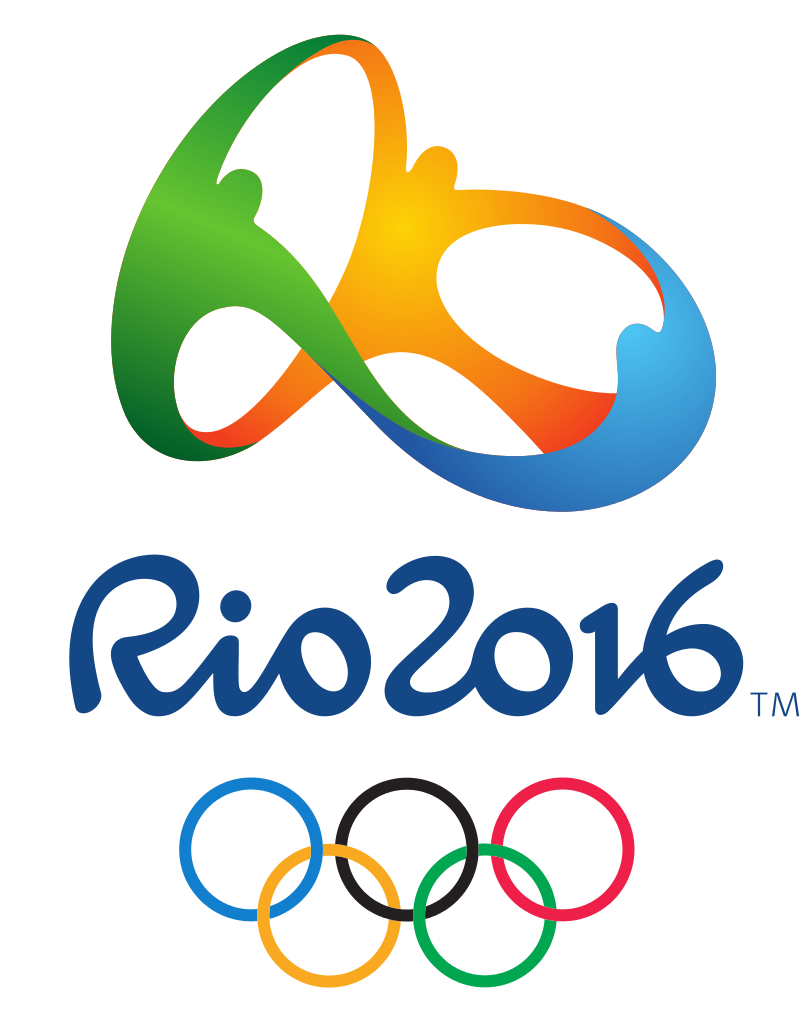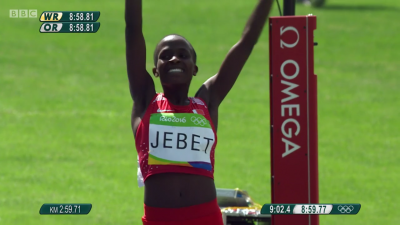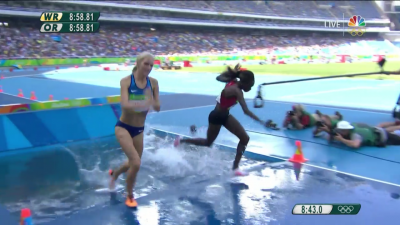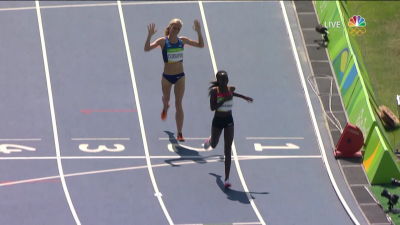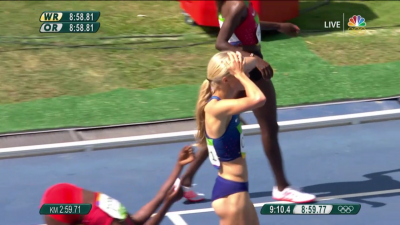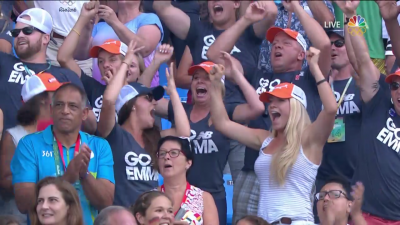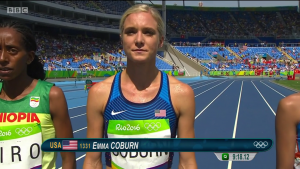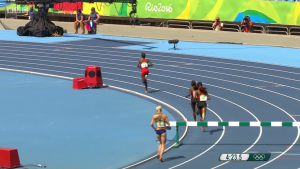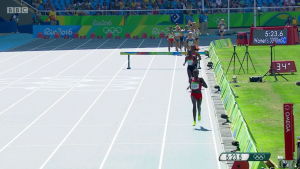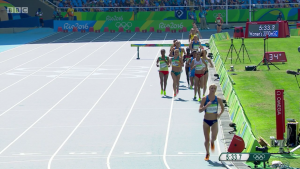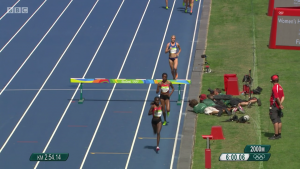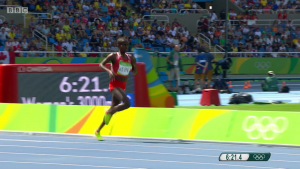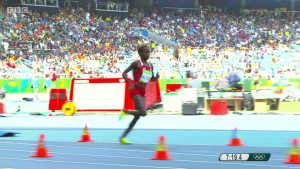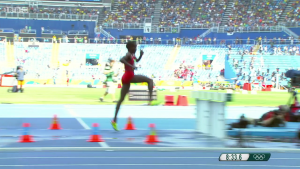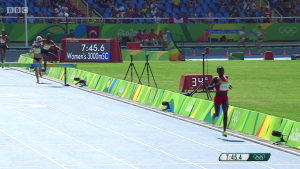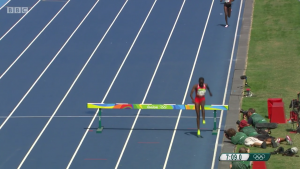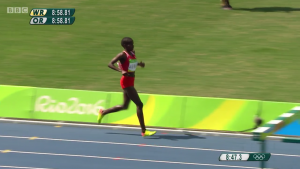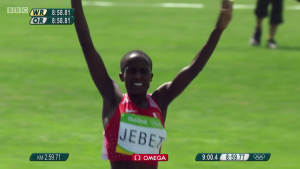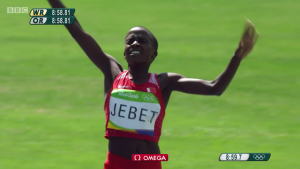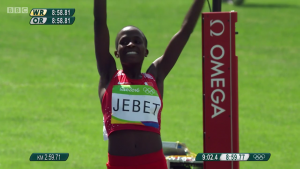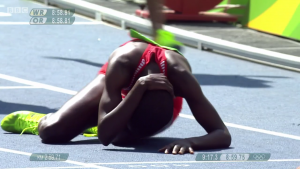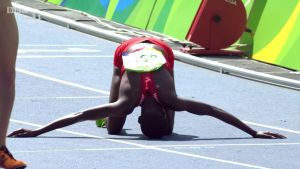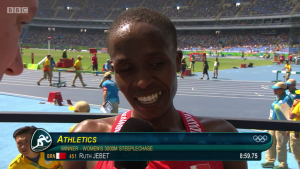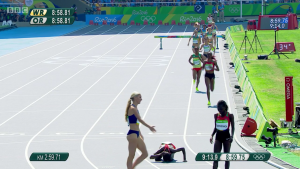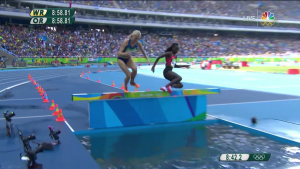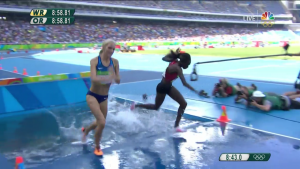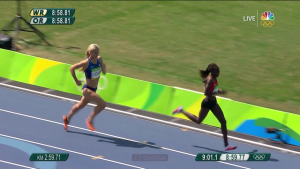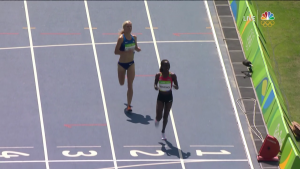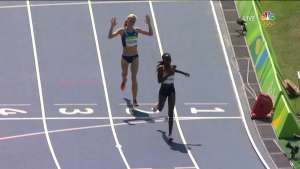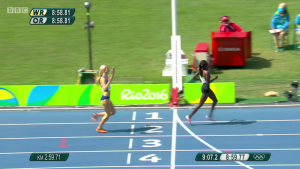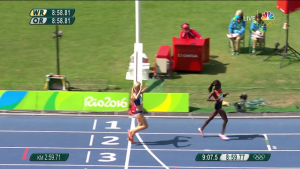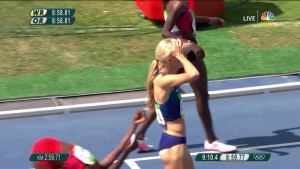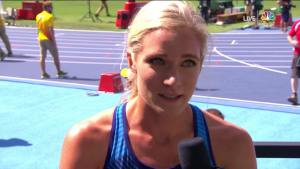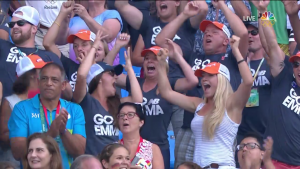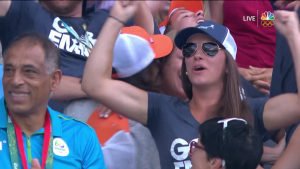Emma Coburn Wins America’s 1st-Ever Women’s Steeplechase Medal in Style as Bahrain’s Ruth Jebet Claims Gold In Near World Record
Coburn Wins Bronze In American-Record Time of 9:07.63
by LetsRun.com
August 15, 2016
RIO DE JANEIRO — Bahrain’s 19-year-old Ruth Jebet came into the women’s steeplechase final at the 2016 Rio Olympics as the world leader and one of only two women in history to have gone under 9:00. She wasn’t about to leave anything to chance. After an opening 1k of 3:05.93, she hammered the final five laps and won gold going away in 8:59.75, just missing the world record of 8:58.81.
Behind Jebet, there was a close battle for silver and bronze between 2015 world champ Hyvin Kiyeng of Kenya and Emma Coburn of the United States. Coburn, who started the final lap about four meters behind of Kiyeng, pulled even at the final water jump but Kiyeng responded and got silver in 9:07.12 as Coburn earned America’s first-ever women’s steeplechase medal in 9:07.63, a new American record (the old record of 9:10.76 was set by Coburn earlier this year at the Pre Classic).
“I’m so grateful. My coaches believed I could do it and my boyfriend believed I could I just trusted their wisdom. They said an aggressive, fast race would make me medal so I trusted them and I went for it,” said Coburn to Lewis Johnson on NBC after the race. “I’m a little bummed that I didn’t have more the last lap to get second, but third in the world is incredible. I’m really happy. Seeing my mom crying just makes me so happy. They’ve been there through the highs and lows. I can’t wait to go hug them.
“I just thought that if Jebet made a move that she’d go pretty aggressively and I have never done that in races so I wanted to just make my closing effort a little more smooth instead of one aggressive move. I just hoped that one of the two Kenyans would fall back and [she] did. Then I passed her (4th placer, Beatrice Chepkoech) and I looked back a couple times just to be sure she wasn’t coming but I couldn’t have asked for a better day.”
| Results 1 Ruth JEBET – BRN 8:59.75 AR 2 Hyvin Kiyeng JEPKEMOI – KEN 9:07.12 3 Emma COBURN – USA 9:07.63 AR 4 Beatrice CHEPKOECH – KEN 9:16.05 PB 5 Sofia ASSEFA – ETH 9:17.15 SB 6 Gesa Felicitas KRAUSE – GER 9:18.41 NR 7 Madeline HEINER HILLS – AUS 9:20.38 PB 8 Colleen QUIGLEY – USA 9:21.10 PB 9 Genevieve LACAZE – AUS 9:21.21 PB 10 Lalita Shivaji BABAR – IND 9:22.74 11 Courtney FRERICHS – USA 9:22.87 12 Habiba GHRIBI – TUN 9:28.75 13 Lydia Chebet ROTICH – KEN 9:29.90 14 Aisha PRAUGHT – JAM 9:34.20 15 Etenesh DIRO – ETH 9:38.77 16 Geneviève LALONDE – CAN 9:41.88 17 Sara Louise TREACY – IRL 9:52.70 18 Fabienne SCHLUMPF – SUI 9:59.30 |
The Race
Ruth Jebet took the lead after two laps and as the runners approached the 1000 (3:05.93), the eventual top four of Jebet, Kiyeng, Coburn and Kenya’s Beatrice Chepkoech had already started to separate themselves from the rest of the pack. And Jebet was just getting started as she put the hammer down with five laps to go. Just 200 meters later, she’d already gapped the field by close to 10 meters. When four laps remained, she led by more than 10 meters (1.9 seconds). How was that possible? Well, Jebet had run the lap in an incredible 68.3 (if she ran all seven laps from the finish line in 68.3, her time would have been 8:40 based on how fast she ran the first half lap-plus).
The two Kenyans tried to respond to the huge injection in pace whereas Coburn responded more gradually, per her pre-race plan. The next lap for Jebet wasn’t much slower – 69.5 – and her lead over the two Kenyan chasers was now more than 20 meters (3.6 seconds) with Coburn more than 20 meters behind second the two Kenyans (3.8 seconds).
On the third to last lap (70.4 for Jebet), Chepkoech, and to a lesser extent Kiyeng, would pay a price for trying to go with Jebet early as Chepkoech faded and lost contact with Kiyeng and Coburn gained on both Kenyans. With two laps to go, Jebet led Kiyeng by more than 30 meters (5.9 seconds). Barring a fall, the gold was Jebet’s but Coburn was now on the heels of Chepkoech and only maybe 15 meters away from Kiyeng.
On the penultimate lap, Coburn went by Chepkoech, who had no response. The bronze was going to Coburn – the question was now could she win silver? At the bell after a 72.2 penultimate lap, Jebet led by nearly 35+ meters (6.6 seconds). A 69.8 would give her the world record. Behind Jebet in the battle for silver, Coburn was now less than a second (.8 second) and only 4-5 meters behind Kiyeng.
On the backstretch, Coburn pulled alongside Kiyeng, but Kiyeng responded and refused to let Coburn get by. As they entered the final water jump, Coburn came up next to Kiyeng yet again but once again the reigning world champ had a response and would hold on for a much-deserved silver.
Up front, Jebet closed in 70.8 for gold and one could argue that Jebet cost herself a world record by not accelerating after clearing the last barrier (it would have been close; we’re not convinced she’d have gotten it), but Jebet was nonplussed about not getting the record when asked about it on the BBC. A very happy Jebet said she could chase the record on the Diamond League circuit – today was all about winning gold. “I won and I congratulate myself,” said a beaming Jebet, who added that the race was “not fun” as it was “too hot.” While officially, the temps were in the high 70’s by the time the race started at 11:15 a.m. local time, a temperature gauge in the sun during the race read 34 Celsius, which is 93 Fahrenheit.
Quick Take #1: This one went totally according to form.
In our race preview, we pointed out that the three fastest women of 2016 had run way faster than anyone else this year as Emma Coburn came into the Olympics with a seasonal best time of 9:10.76 that was more than six seconds faster than the #4 seed (9:16.87).
The three top seeds today went 1-2-3 today.
2016’s Fastest performers (among women entered)
- Ruth Jebet, Bahrain 8:59.97 – gold medal in new pb of 8:59.75
- Hyvin Kiyeng, Kenya 9:00.01 – silver medal
- Emma Coburn, USA 9:10.76 – bronze medal in new pb of 9:07.12
Coburn is now #8 on the world all-time list.
That doesn’t mean this wasn’t a thrilling watch to race. Tim Hutchings, broadcasting on NBCSN, nailed the drama of this race perfectly as it was happening. During the second kilometer, he observed, “The split for this middle kilometer is going to be legendary because she’s gone beserk out there after a 3:05.9 opener.”
For the record, the 2000 split was 6:00.06, meaning Jebet ran the second km in 2:54.13.
Quick Take #2: A pioneering accomplishment for Coburn
Coburn first flashed her potential in stunning the field to win the Shanghai Diamond League two years ago, the first step in a breakout 2014 season. Ever since then, the only question that mattered about Coburn was “Can she medal at a global championship?” She answered that with a resounding yes in Rio this morning.
After her American record at the Pre Classic in May, Coburn looked to have a good shot to medal, and to actually come out and do it — and lower her American record in the process — is a tremendous accomplishment. It is not easy run the best race of your life in the most important race of your life; only the true greats can do something like that.
Coburn’s medal was not just for her, but a testament to the progress the U.S. has made on the steeplechase in the eight years since the event made its Olympic debut. In 2008, Jenny Simpson, now Coburn’s training partner, broke the American record at the Olympics by running 9:22.26 to finish ninth, 15 seconds back of a medal. Even four years ago, if you had offered odds on which distance event the U.S. was most likely to medal in in 2016, women’s steeple probably would have been near the bottom of the list.
Today, three Americans ran 9:22 or faster, with Coburn’s 9:07 bronze-medal winning effort the highlight. Only Kenya (whose athletes went 2-4-13 today) can claim to be better in the steeplechase than the United States.
“A medal, I feel like we’re getting better and better in this newer event and being able to compete against the Kenyans and Ethiopians, is really, that’s amazing,” Quigley said.
Quigley added that the absence of the Russians — who claimed the last two Olympic titles in this event (Yulia Zaripova’s 2012 title was later stripped) — certainly helped the Americans’ chances, but said the collegiate system has also helped to develop talent.
“All the girls in college hurdle better than 75% of the field out here,” Quigley said. “Emma’s absolutely flawless over the hurdles and I think it saves her a lot of time and energy…Having been around it longer, people are more interested in it now. People that are not just not able to get in the 5k but are really good runners are running the steeple and that makes us more competitive.”
Ethiopia has a surplus of 5k talent, but has not yet figured out a way to translate that into steeple success. Having the NCAA system, with a plethora of quality coaches and facilities in which to practice hurdling, is a massive advantage for American women.
Aisha Praught is an American citizen who runs for Jamaica knew how significan Emma’s accomplishment was. “It’s phenomenal. Every steeplechaser woman around the world world has been waiting for this to happen for Emma. Emma is fearless and she goes for it every time she steps on the line. She is somebody who has raised the game for every non African steeplechase woman in the world and her winning that victory is a victory for everyone,” Praught said.
Quick Take #3: The race wound up essentially as a re-run of the Pre Classic steeple, which played into Coburn’s hands
Just as in Eugene, Jebet pushed the pace hard from the middle of the race onward and totally strung out the field. However, unlike at Pre, where Kiyeng closed the gap on Jebet and almost nipped her at the line, Kiyeng was actually falling further off the pace and had to battle Coburn just to take silver. In both cases, Coburn was able to run mostly on her own, not fast enough to win but faster than anyone outside the top three could handle.
“I was hoping that Ruth would take it because on paper we are the top three fastest times,” Coburn said. “I knew that if Ruth would push hard, the field would string out and that was my best chance at a medal. So I was really happy when she took it because if she wasn’t going to take it, I was gonna have to make it go fast.”
Quick Take #4: Jebet’s hard push led to a very fast day overall despite sunny, warm conditions
It was hot on the track, but that didn’t affect the times as seven of the top nine women PR’d. Included in that total were three national records (Jebet for Bahrain, Coburn for the U.S.) including one by Germany’s Gesa Felicitas Krause. Last year, Krause ran a pb of 9:19.25 and that time got her bronze. Today, she ran faster (9:18.41) and broke Antje Möldner-Schmidt‘s national record of 9:18.54 but only got 6th.
Krause said, “I’m really happy I set a new Germany record. I was chasing the record for a couple of years now, but deep in my heart I wanted to run faster and maybe chase a medal too, but the race was really quick today.” Krause said the others learned from last year’s race and made this a fast race to take her kick away.
A special shoutout to Genevieve LaCaze of Australia, who has run 19 races on the track this year across all distances and PR’d in 11 of them including today’s 9:21.21 for ninth.
Quick Take #5: A great run for Colleen Quigley, who only started running in April after a hip injury cost her several months this winter
Quigley was eighth in a personal best of 9:21.10 today, an improvement of four spots and 13 seconds on her result at Worlds last year. Based on her 2015 results, this wasn’t a surprise, but given she battled a hip injury for several months (she ran for a few weeks early this year but missed most of February, all of March and a good chunk of April), to deliver this result was extremely impressive.
“Last summer, yes, I thought I could make the Olympic final,” Quigley said. “And then the fall I was still thinking, yeah, you know, I have time. Like December, January, February, March, I still wasn’t running and I was like ‘Uh, maybe not.’ Definitely, the dream started to become less and less realistic.”
But Quigley regained her fitness quickly with thanks to treatment from John Ball in Phoenix and by the time the Trials rolled around, she was believing in herself again.
Quick Take #6: Frerichs said it was “slightly bittersweet” to narrowly miss out on a top-10 finish but was overall happy with her performance
Frerichs didn’t have any regrets with the way she raced. Her goal was simply to make the final here, so anything beyond that was a bonus. It has been a long year for Frerichs, but she has made a lot of progress from last year and hopes to break into the top 10 in London next year in her first full year as a professional.
“I could feel the eight steeples in my legs today, definitely,” Frerichs said. “But like I said, my eighth steeple last year I ran 9:46 at USAs so I think to come out, finish 11th, run 9:22, be a second off a top-10 finish is a lot better than last year.” Frerichs said running versus the pros is still a learning experience, “I haven’t gotten a lot of experience being in the middle or being in the back and being pushed around.”
Frerichs will head back to family’s home in Missouri for a week before starting her new life in Portland, where she already has an apartment picked out, as a member of the Bowerman Track Club.
First however, she’ll get to take in more of the “spectacle of the Olympics” and start figuring out who to do what Emma did. Of Emma’s medal she said, “I think it’s amazing. It sets the bar really high for us. I’ve looked up to Emma for the last four years. It makes me excited. It gives me hope one day I’ll be able to be up there too.” Frerichs noted Emma was 9th at the last Olympics and third today, so that gives her hope with her 11th place finish today.
QT #7: Bahrain Gets Its First Gold
Jebet’s medal was the first ever Olympic gold for Bahrain in any sport. Jebet was grateful to get the opportunity to run for Bahrain saying, “I went to Bahrain because I got a chance in school…Maybe if I was in Kenya I would not get the opportunity to go to the Olympics.”
QT #8: A Mark Wetmore Athlete Gets Their First Olympic Medal
Coburn’s bronze was the first Olympic medal for a Mark Wetmore-coached athlete. Coburn was honored to be the first one with all the great athletes Wetmore has coached (Jenny Simpson, Kara Goucher, among others) but felt it was just a matter of timing with training partner Simpson a medal threat here. “It’s strange to be their first Olympic medallist. I think that is
just the luck of whether the steeple was before the 1500. It’s definitely a privilege to be their first Olympic medalist,” she said.
QT #9: Aisha Praught Disappointed with Her Run
Praught finished 14th today and said, “I had several stages of goal(s), without a doubt in my mind I wanted to be top 10 today, aiming for top 5, aiming to just race. For me it was all about executing the racing plan…staying calm and attacking when it was time to attack.” However, “Today I couldn’t answer every surge.” Praught was very composed in the mixed zone until we asked her about her composure and then her voiced cracked the slightest and she said, “I’m very crushed and I’m going to try and keep it together until I get out of the mixed zone.”
Talk about the race on our messageboard:
Here are some screenshots from the tv broadcasts of the race on NBC and the BBC. Click for a larger image.
- Ruth Jebet wins gold
- Ruth Jebet celebrates
- The final water jump
- Emma Coburn gets her medal
- Emma Coburn is stunned
- Coburn post-race
- Coburn had a ton of supporters in the stands
- Emma’s Fans
